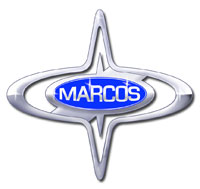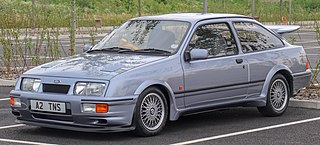
The Lotus Seven is a sports car produced by the British manufacturer Lotus Cars between 1957 and 1973. The Seven is an open-wheel car with two seats and an open top. It was designed by Lotus founder Colin Chapman and has been considered the embodiment of the Lotus philosophy of performance through low weight and simplicity. The original model was highly successful with more than 2,500 cars sold, due to its attraction as a road legal car that could be used for clubman racing.
Caterham Cars Ltd. is a British manufacturer of specialist lightweight sports cars established in Caterham, England, with their headquarters in Dartford, England. Their current model, the Caterham 7, originally launched in 1973, is a direct evolution of the Series 3 Lotus Seven designed by Colin Chapman. In the 1990s the company made the Caterham 21, a two-seater soft top alternative to the MG F and Lotus Elise,. A track-only car, the SP/300.R, a joint project with Lola was released for customer testing in 2010 and was scheduled for release in 2013.

The Morris Marina is a front-engined, rear-wheel-drive small family car that was manufactured by the Austin-Morris division of British Leyland from 1971 until 1980. It served to replace the Morris Minor in the Morris product line, which had first been built in 1948. The Marina was also sold in some markets as the Austin Marina, the Leyland Marina and the Morris 1700.

Marcos Engineering was a British sports car manufacturer. The name derives from the surnames of founders Jem Marsh and Frank Costin.

The Caterham 7 is a super-lightweight sports car produced by Caterham Cars in the United Kingdom. It is based on the Lotus Seven, a lightweight sports car sold in kit and factory-built form by Lotus Cars, from 1957 to 1972.

Lotus Elan is the name of two separate ranges of automobiles produced by Lotus Cars. The first series of cars was produced between 1962 and 1975 as a rear-wheel drive vehicle. The second series was produced between 1989 and 1995 as a front-wheel drive vehicle.

The Ford Zephyr is an executive car manufactured by Ford of Britain from 1950 until 1972. The Zephyr and its luxury variants, the Ford Zodiac and Ford Executive, were the largest passenger cars in the British Ford range from 1950 until their replacement by the Consul and Granada models in 1972.

The Shelby Mustang is a high-performance variant of the Ford Mustang built by Shelby American from 1965 to 1967 and by the Ford Motor Company from 1968 to 1970.

Gilbern, Gilbern Sports Cars (Components) Ltd , was a Welsh car manufacturer from 1959 to 1973, based in Llantwit Fardre, Pontypridd, Glamorgan, Wales.

Ginetta Cars Limited is a British specialist builder of racing and sports cars based in Garforth, Leeds, West Yorkshire.

Rochdale cars were a series of mainly glass fibre bodied British sports cars made by Rochdale Motor Panels and Engineering in Rochdale, Greater Manchester, England between 1948 and 1973. The company is best remembered for the Olympic coupé made between 1959 and 1973.

The Avenger GT was a kit car produced by Fiberfab. It was designed in California and manufactured in the United States and Canada for 12 years, from late 1966 until 1978.
Sylva Autokits is a kit car manufacturer based in Lincolnshire, England. Sylva was founded in 1981 by Jeremy Phillips and has developed and produced a number of small and lightweight sports cars. Sylva cars have won a number of 750 Motor Club Kit Car championships.
The 2 seat Sylva Leader was derived from the Sylva Star kit car. Slightly less extreme styling led to better sales. Based on the ever popular Lotus 7 style of car there were many similar designs over the years.

The Ford Falcon (EA) is a full-size car that was produced by Ford Australia from 1988 to 1991. It was the first iteration of the fifth generation of the Falcon and also included the Ford Fairmont (EA)—the luxury-oriented version.
The Blakely Bantam was a kit car produced by Blakely Auto Works, a manufacturer of kit cars located in a series of US midwest communities in the 1970s and 1980s. Blakely Auto was founded by Dick Blakely to market affordable sports cars in the spirit of the legendary Lotus Seven: compact, lightweight, and with excellent handling. The Bantam's design inspiration was the Dutton, a Lotus Seven replica built in Britain. The Bantam was introduced in 1972 as Blakely's first offering, followed by the larger Bearcat and eventually by the Bernardi. Production of the Bantam continued into the 1980s, when the model was renamed the Hawk, and stopped with the dissolution of Bernardi Auto Works in the later 1980s.

The Ford Sierra RS Cosworth is a high-performance version of the Ford Sierra that was built by Ford Europe from 1986 to 1992. It was the result of a Ford Motorsport project with the purpose of producing an outright winner for Group A racing in Europe.

Haynes Roadster is a replica of a Lotus Seven home-built car, according to the book Build Your Own Sports Car: On a Budget by Chris Gibbs (ISBN 1-84425-391-0). A Ford Sierra is used in the car as a donor for drivetrain and suspension components.
Mills Extreme Vehicles (MEV) is a kit car design and manufacturing company based in Gloucestershire, England, founded in 2003 by Stuart Mills and Julie Wilson.

The Dax Rush is a lightweight two-seater sports car that is offered as a kit. It has a multi-tube triangulated steel space frame chassis, front engine and rear wheel or four wheel drive. The body is constructed in Glass-Reinforced Polymer (GRP) with optional aluminium side panels and bonnet. It complies with the Single Vehicle Approval (SVA) scheme. Two optional rear suspension technologies are offered; De Dion and the IRS. The car is known for its 0–100 km/h performance of close to 3 second runs.
















